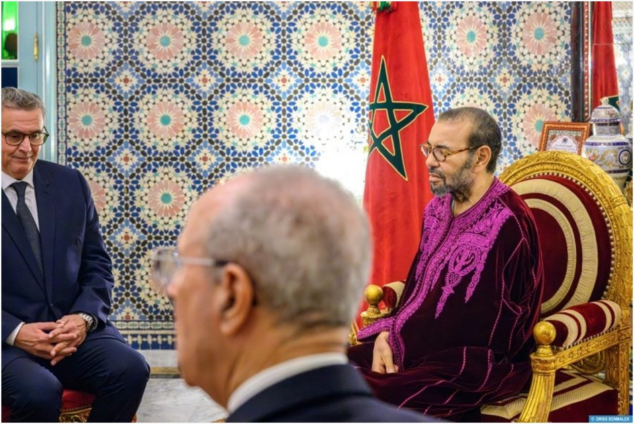King Mohammed VI chaired a critical working session on Monday, December 23, 2024, at the Royal Palace in Casablanca, focusing on the reform of Morocco’s Family Code.
The session marked the conclusion of the body responsible for revising the code, which submitted a report containing 100 proposed amendments.
The King referred proposals tied to religious texts to the Supreme Council of Ulemas for legal opinions, as stated in a press release from the Royal Cabinet.
He also made pivotal decisions on matters requiring arbitration and invoked principles aligned with the guidelines outlined in his royal letter to the head of government.
These principles, particularly the rule of “Do not prohibit what is authorized, nor authorize what is prohibited,” served as the foundation for the deliberations.
Strengthening Family as a Cornerstone
The reform of the Family Code, initiated in 2004 under King Mohammed VI, aims to reinforce the family unit as the bedrock of Moroccan society.
During the session, the Minister of Justice, Abdellatif Ouahbi, presented the methodology of the revision process, emphasising listening sessions and highlighting key proposals.
Ahmed Toufiq, Minister of Habous and Islamic Affairs, representing the Supreme Council of Ulemas, presented the council’s conclusions.
The council integrated the principle of Maslaha (interest) to propose solutions consistent with Sharia while addressing modern challenges faced by Moroccan families.
“This demonstrated the capacity for constructive Ijtihad within the Moroccan School of Fiqh, rooted in moderation and Morocco’s religious constants,” the statement noted.
Call for Constructive Ijtihad
King Mohammed VI urged the Supreme Council of Ulemas to continue its innovative Ijtihad, particularly regarding family-related Fiqh issues.
He encouraged the creation of a dedicated framework within the council to address evolving societal changes requiring modern solutions.
To ensure transparency, the King instructed the Head of Government and relevant ministers to regularly communicate updates about the revision process to the public.
He stated that the government must finalise the legislative draft within a reasonable timeframe, aligning with constitutional provisions.
Guidelines for Legislative Phase
The King highlighted key principles—justice, equality, solidarity, and harmony derived from Islam and Morocco’s international commitments—that should underpin the legislative phase.
He stressed the importance of clear legal drafting to facilitate implementation and prevent judicial misinterpretations.
Attendees of the Session
Present at the session were Aziz Akhannouch, Head of Government; Abdellatif Ouahbi, Minister of Justice; Ahmed Toufiq, Minister of Habous and Islamic Affairs and Naima Ben Yahia, Minister of Solidarity, Social Integration, and the Family.
The session underscores King Mohammed VI’s commitment to modernizing the Family Code while respecting Morocco’s cultural and religious values, fostering a fair and equitable legal framework for Moroccan families.
Latest Stories
-
Cucumbers – Making the most of them
2 hours -
Revenue growth to slowdown to GH¢209.3bn in 2025; T-bills will not be restructured – IC Research
3 hours -
Deloitte celebrates end-of-year Thanksgiving Service
3 hours -
Inflation to end 2025 between 10% and 12% – Databank Research
4 hours -
Government’s commitment to fiscal consolidation to remain strong in 2025
4 hours -
ImageBureau, April Communications take theatre to Nsawam Prisons
4 hours -
Bird flu kills 20 big cats at US animal sanctuary
4 hours -
Your peaceful conduct saved the country from tension – Clergymen commend Bawumia
4 hours -
A Nite of 1031 Laughs & Music to provide emergency insurance for patrons
4 hours -
Body found in wheel well of United plane after landing in Hawaii
5 hours -
Ghana Armed Forces dismisses viral audio alleging ammunition transfer
5 hours -
Former Hohoe MP Bernice Adiku Heloo passes on
6 hours -
CODEO calls for re-run of Ablekuma North, Dome Kwabenya parliamentary elections
7 hours -
4,155 cholera cases with 35 deaths recorded by December 23 – GHS
7 hours -
Mothers celebrate arrival of Christmas Day babies at Ridge Hospital
9 hours

